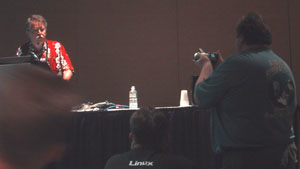LinuxWorld--Day Two
Walking the floor of a show between various obligations gives one a cell's-eye view of the whole organism. What's it up to? Here are a few clues from what I overheard:
<il>* An argument about whether Mandrake is "bogus" for releasing an allegedly problematic distribution, or praiseworthy for at least trying to address the desktop market that other distros have allegedly abandoned. Soon this involved three or four people. It broke up when everybody seemed to agree there were better things to argue about.<il>* Rick Lehrbaum, embedded Linux guru, says there are about 125 embedded Linux vendors at the show. That's half as many as there were last Winter, and last Summer as well. But relative to the total number of exhibitors at the show, the percentage of embedded vendors has gone up from 10% to 25%.<il>* Somebody says "The tent is falling down. It needs to finish before we put up a new one. Some of the same folks will be involved, but they won't be doing the same things the same ways."<il>* I missed both Larrys this morning: Augustin and Lessig. I heard great things about both. "It was a call to arms," somebody said about Larry Augustin's speech. "Very impassioned" said another. About Larry Lessig's speech, somebody said "that guy really makes you think." Another said "He's a really good speaker." I'll have to get both tapes.<il>* Somebody said "It's the end of the beginning. `Now what?' is looking like a real good question". He meant this in a positive sense. <r>

I was just interviewed live with Stig Hackvän by Govinda for EarthCycles Radio (which is on Live365), and will run later on Radio4All.net (search for RadioActive Productions). Govinda and his various operations are tied in with the micropower/pirate radio community, with which I have many sympathies. While we were talking, Stig came up with some very quotable lines that probably lose a lot out of context. Four of the most memorable are:
<il> I think the G in the GPL stands for Grumpy. Stallman squanders optimism like it's going out of style.
<il> GPL is a recycle ethic. By focusing on one issue of reusability is a sellout of the artistic process.
<il> How many start ups spun off of Neuromancer, Snow Crash and The Matrix?
Stig 's wearing a black t-shirt that says "Copyright infringement is your best entertainment value." It's from the band Negativland. The link is here. He also quoted George Santayana: "Fanaticism consists of redoubling your effort when you have forgotten your aim".
Every few minutes I seem to run again into Donald K. Rosenberg of Stromian Technologies, an MBA and Ph.D. who wears the best-looking suit at the show. Don wrote the authoritative Open Source: The Unauthorized White Papers (M&T Books, 2000), which Larry Lessig last night told me (personally) was "a great resource." It's one of those books I actually bought twice, thinking I hadn't bought it already, at an on-line bookstore. Larry's right. It's a terrific book: authoritative yet readable, concise, fair. And highly useful. So I'm plugging it. (Somebody over my shoulder said "And he's a nice guy." Yes, he is.)
Walking around the floor of the show again later, I didn't get quite the same down feeling that I got yesterday, and even earlier today. The Borland folks were quite pleased with the level of interest in Kylix, which they say is high. Transvirtual as usual had a crowd of geeks surrounding its PocketLinux booth. IBM and HP are all over the place, handing out tickets to stuff and seemingly on the fringe of every conversation.
Blessedly muted is the customary obsession with Microsoft. Linus and others (I am told) poo-pooed the Great Threat of Passport in a panel this morning. More significantly, Microsoft hasn't been what Donald Norman calls a "conversational black hole" into which all energy flows and no light escapes. Its mass is clearly diminished--at least in the conversations I've been around.
email: ljeditors@ssc.com






